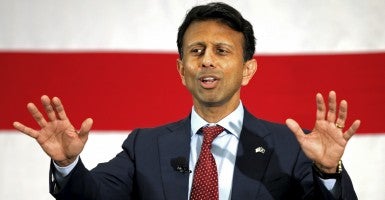Defying state legislators who rejected a measure that sought to protect “the right of conscience as it relates to marriage,” Louisiana Gov. Bobby Jindal acted on his own Tuesday.
“I’m going to do anything I can to protect religious liberty,” the Republican governor told The Daily Signal in a phone interview on Wednesday.
His executive order, issued after state legislators voted down the Louisiana Marriage and Conscience Act, prohibits “all departments, commissions, boards, agencies, and political subdivision of the state” from discriminating against people or businesses with deeply held religious beliefs about marriage.
“My executive order accomplishes the intent of the [Louisiana Marriage and Conscience Act]. It prevents the state from discriminating against people or their business with deeply held religious beliefs,” Jindal said.
The measure builds on a Religious Freedom Restoration Act that was enacted during Jindal’s first term as governor. The state of Louisiana, under a Constitutional amendment, also defines marriage strictly as the union between a man and a woman.
“I’m going to do anything I can to protect religious liberty,” -@BobbyJindal.
Critics say Jindal’s executive order, which will expire 60 days after the 2016 legislative session unless the next governor chooses to extend it, goes too far, enabling businesses to discriminate against same-sex couples.
“It flat out gives individuals a right to discriminate, period,” said Human Rights Campaign legal director Sarah Warbelow of the bill legislators rejected.
Critics also voiced concerns the measure could hurt tourism in the state.
In defending his executive order, Jindal said there are “actual examples” of states “discriminating against florists and others,” by taking away their basic rights to religious liberty and forcing them to pay “thousands of dollars in fines.”
Barronelle Stutzman, the florist Jindal was referring to in his example, owns a small flower shop in Washington state.
After refusing to make flower arrangements for a gay couple’s wedding because of her Christian beliefs about marriage, Stutzman faced two lawsuits, which have since been consolidated: One brought by the American Civil Liberties Union on behalf of the gay couple, and another brought by the state’s attorney general.
>>> Read More: State Says 70-Year-Old Flower Shop Owner Discriminated Against Gay Couple. Here’s How She Responded.
Jindal says his order would restrict the state from being able to carry out such lawsuits.
“Even if you don’t agree with me on the definition of marriage … you still should want those folks to have their rights—our rights to live the way we want,” he said.
Jindal, who is exploring a 2016 presidential bid, doesn’t shy away from his support for traditional marriage.
“I believe in the traditional definition of marriage,” he said. “Unlike President Obama and Hillary Clinton, my opinions are not evolving on this issue. But at the end of the day, this is even bigger than marriage.”
Jindal has criticized Obama on a number of occasions for issuing executive orders, most notably in regards to his decision to grant legal status to an estimated 5 million illegal immigrants.
“The President is lecturing us and not listening to us. He’s bypassing Congress, and ignoring the American people,” he said in a November statement last year. “Unilaterally granting amnesty to millions of illegal immigrants does nothing to solve our immigration problem, it only makes it worse.”
Defending his decision, Jindal said, “This is different. We’re simply trying to support people’s Constitutional rights.”
Ultimately, Jindal knows that not everyone agrees with his stance on marriage, which is why he believes his executive order was necessary.
“Don’t waste your breath trying to bully me in Louisiana,” -@BobbyJindal.
Jindal believes that both sides of the debate should be able to tolerate one another’s stance on marriage, but has a stern message for those who believe business owners must check their religious beliefs at the door:
“Don’t waste your breath trying to bully me in Louisiana,” he said. “It is absolutely constitutional to have religious liberty and economic freedoms.”
































